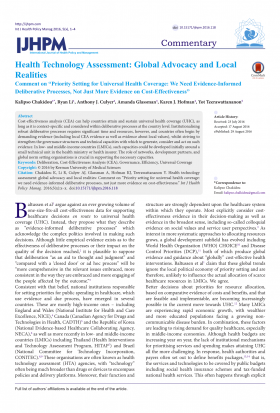This website uses cookies so that we can provide you with the best user experience possible. Cookie information is stored in your browser and performs functions such as recognising you when you return to our website and helping our team to understand which sections of the website you find most interesting and useful.
Health Technology Assessment: Global Advocacy and Local Realities

รายละเอียดเพิ่มเติม
Abstract
Cost-effectiveness analysis (CEA) can help countries attain and sustain universal health coverage (UHC), as long as it is context-specific and considered within deliberative processes at the country level. Institutionalising robust deliberative processes requires significant time and resources, however, and countries often begin by demanding evidence (including local CEA evidence as well as evidence about local values), whilst striving to strengthen the governance structures and technical capacities with which to generate, consider and act on such evidence. In low- and middle-income countries (LMICs), such capacities could be developed initially around a small technical unit in the health ministry or health insurer. The role of networks, development partners, and global norm setting organisations is crucial in supporting the necessary capacities.




